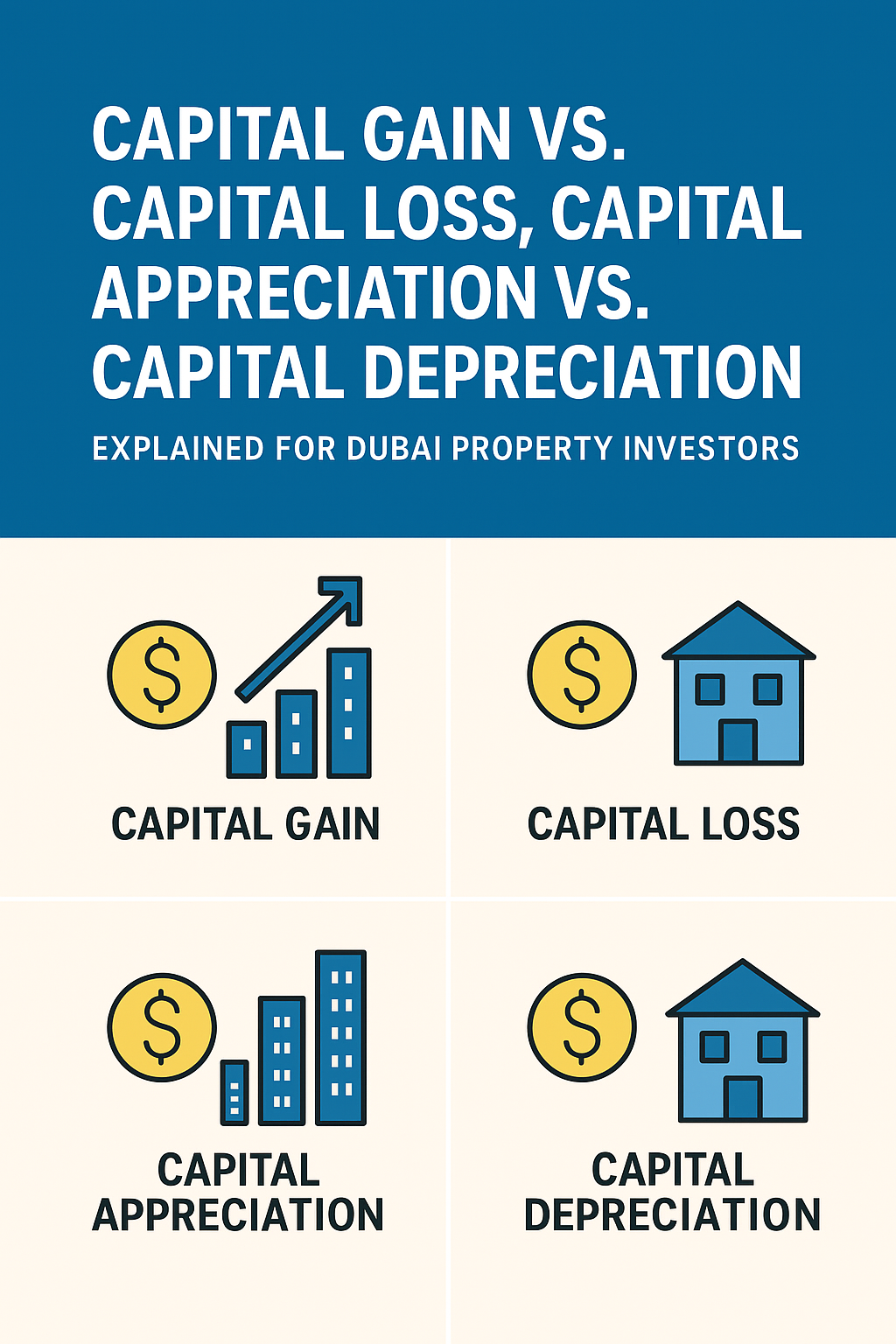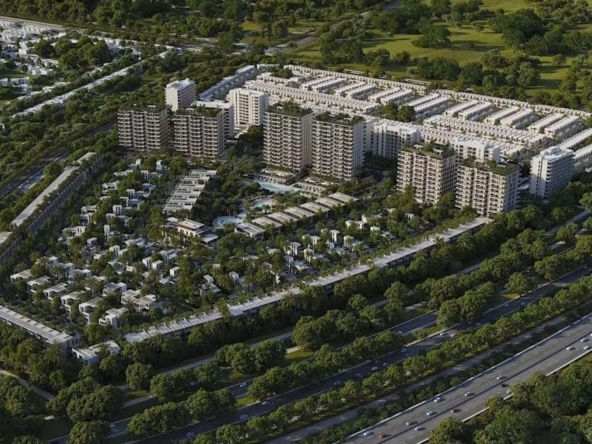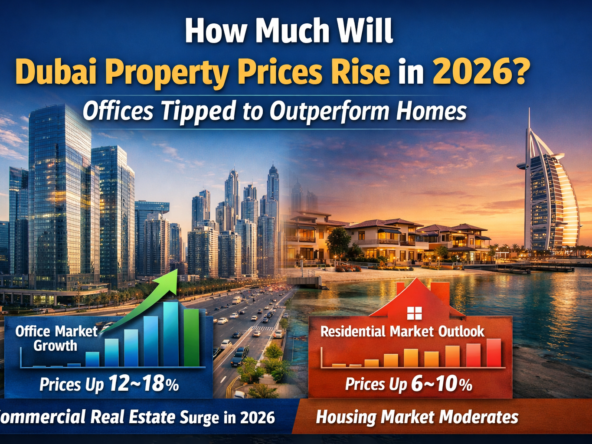The Dubai real estate market is one of the most lucrative investment arenas globally, attracting both local and international investors. Understanding capital gain, capital loss, capital appreciation, and capital depreciation is essential for maximizing returns and minimizing financial risks. Whether you are a seasoned investor or a first-time property buyer in Dubai, mastering these financial concepts can significantly influence your investment success.
Understanding Capital Gain and Capital Loss in Dubai Real Estate
What Is Capital Gain?
A capital gain occurs when you sell a property for more than its purchase price. For example, if you purchased an apartment in Downtown Dubai for AED 2 million and later sold it for AED 2.5 million, your capital gain would be AED 500,000. This profit represents the increase in the property’s market value over time.
Capital gains can be realized (when you sell the property) or unrealized (when the property’s market value increases but you still own it). In Dubai, investors benefit from the absence of capital gains tax, making real estate a highly attractive investment avenue.
What Is Capital Loss?
A capital loss occurs when you sell your property for less than the purchase price. For instance, if your AED 2 million villa in Arabian Ranches is sold for AED 1.8 million, you incur a capital loss of AED 200,000. Such losses may arise due to market downturns, economic slowdowns, or oversupply in specific areas.
In Dubai, while you cannot claim tax deductions for capital losses (since there’s no personal income tax), understanding losses helps investors manage portfolio risk and investment timing effectively.
Capital Appreciation vs. Capital Depreciation: Key Differences
What Is Capital Appreciation?
Capital appreciation refers to the increase in the market value of a property over time, irrespective of whether it has been sold. It is influenced by factors such as:
-
Location growth (e.g., infrastructure development in Dubai Creek Harbour or Dubai South)
-
Increased demand for luxury or off-plan properties
-
Government initiatives, such as residency-by-investment programs
-
Improved amenities and community development
For example, properties in Business Bay or Jumeirah Village Circle (JVC) have shown steady appreciation due to Dubai’s urban expansion and increased investor confidence.
What Is Capital Depreciation?
Capital depreciation is the decline in the property’s value over time due to factors such as:
-
Property aging or poor maintenance
-
Market oversupply
-
Neighborhood decline
-
Shifts in buyer preferences
In some cases, depreciation is temporary, especially in emerging areas. For example, short-term oversupply in Dubai Marina might depress prices, but long-term urban development often restores property value.
Factors Influencing Capital Gain and Capital Appreciation in Dubai
1. Location and Infrastructure Development
The golden rule in Dubai real estate remains: “location drives value.” Properties near key landmarks—such as Burj Khalifa, Dubai Mall, or Palm Jumeirah—tend to experience higher appreciation and stronger demand. Additionally, infrastructure projects like Dubai Metro expansions and new highway links enhance accessibility and boost property values.
2. Economic Growth and Foreign Investment
Dubai’s robust economic policies, foreign investment incentives, and freehold ownership zones play a major role in real estate appreciation. Foreign investors from countries like India, the UK, and Russia continue to fuel property demand, creating upward pressure on prices.
3. Government Regulations and Market Transparency
The Dubai Land Department (DLD) and Real Estate Regulatory Agency (RERA) ensure market transparency and investor protection. Regulatory frameworks such as Ejari and DLD transaction records increase buyer confidence, supporting long-term value appreciation.
4. Supply and Demand Dynamics
An oversupply of residential units can cause temporary price drops and capital depreciation. However, Dubai’s evolving population, job opportunities, and tourism growth ensure sustained long-term demand.
Comparing Capital Gain vs. Capital Appreciation
While both terms relate to property value increases, their application differs:
| Aspect | Capital Gain | Capital Appreciation |
|---|---|---|
| Definition | Profit realized when selling a property | Increase in market value over time |
| Realization | Occurs upon sale | Occurs even without sale |
| Impact | Immediate financial profit | Long-term wealth accumulation |
| Tax in Dubai | No capital gains tax | No tax on appreciation |
Both metrics are critical for strategic investment planning in Dubai’s dynamic property market.
Practical Example for Dubai Investors
Consider an investor purchasing a 2-bedroom apartment in Dubai Hills Estate for AED 1.5 million in 2020. By 2025, the property value increases to AED 2 million due to infrastructure growth and rising demand.
-
Capital Appreciation: AED 500,000 (unrealized gain as long as the investor holds the property)
-
Capital Gain: Realized only when the property is sold at AED 2 million
If market conditions worsen and the property value drops to AED 1.3 million, this results in capital depreciation of AED 200,000 and a potential capital loss if sold.
How Dubai Investors Can Maximize Capital Gains
1. Invest in Emerging Communities
Newly developing areas such as Dubai South, Meydan, and Al Furjan offer affordable entry points and high potential for appreciation as infrastructure matures.
2. Focus on Off-Plan Projects
Off-plan properties by top developers like Emaar, Sobha, or DAMAC often deliver substantial capital gains upon handover due to lower pre-launch pricing and rising post-completion demand.
3. Timing the Market
Understanding Dubai’s property cycle—expansion, stabilization, correction, and recovery—helps investors buy low and sell high, optimizing returns.
4. Maintain Property Quality
Regular maintenance, modern upgrades, and professional management ensure your asset retains and increases its value over time.
Risks Associated with Capital Loss and Depreciation
While Dubai’s property market offers high potential returns, investors should be aware of associated risks:
-
Economic downturns can lower property demand.
-
Currency fluctuations may affect foreign investors’ profitability.
-
Over-leveraging (using too much borrowed capital) can magnify losses.
-
Regulatory changes or unexpected global events (e.g., pandemics) can cause temporary market disruptions.
Mitigating these risks through diversification, market research, and professional property management is essential for long-term success.
Conclusion: Smart Investing in Dubai’s Real Estate Landscape
The difference between capital gain and loss, and capital appreciation and depreciation, defines an investor’s ability to thrive in Dubai’s ever-evolving property market. By focusing on location, timing, market trends, and long-term growth strategies, investors can ensure consistent profitability and sustained wealth creation.
Dubai continues to attract global investors seeking tax-free profits, world-class infrastructure, and high ROI opportunities. Understanding these financial principles not only protects your investment but also positions you to make smarter, data-driven property decisions for the future.




